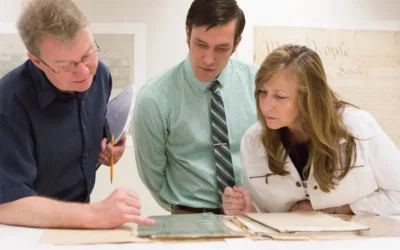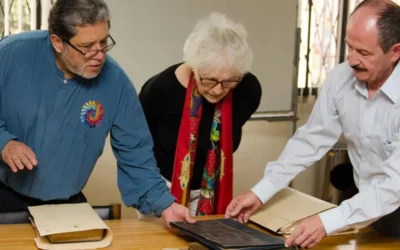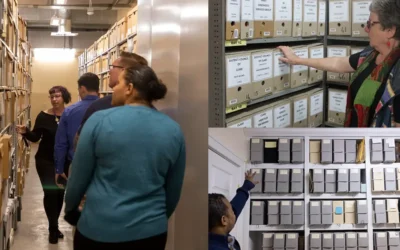Archives and Records Management: A Symbiotic Pairing
Margot Note
Records management aims to deliver the right information at the right time to the right people at the lowest cost. A robust records management program saves time, costs, and space and mitigates risk. It also strengthens archival programs.
A record is evidence of an activity or transaction, and a records retention program tracks the storage, tracking, and destruction of records. Records management identifies the documents to keep and outlines guidelines for how long different record types should be stored and how they should be destroyed.
The relationship between the archives and records management professions is symbiotic in many ways. Both are called upon to identify which records they will manage, and they also need to be careful about maintaining the physical and intellectual integrity of the documents in their care. Archivists and records managers need to describe and arrange records to provide access as well as contextual information. They both observe necessary legislation regarding disposal, privacy, intellectual property, and other issues. Lastly, they maintain the physical–including digital–condition of records.
Our Different Points-of-View
However, the professions also have variances. They have diverse cultural, societal, and historical dimensions. Archives may be seen as either a warehouse of dusty materials or as interested only in serving outside historical research. Archives can be viewed as lacking insight into the ongoing processes of the organization so that the records are only a static product. The professions also require different education and training. Records management training is more vocational, while archival training is more academic. The certification process differs as well; qualifying individuals can become certified through a test proctored by the Academy of Certified Archivists, while future records managers take a series of six exams administered by the Institute of Certified Records Managers. (I serve on the exam committee, and I can attest to the amount of consideration that goes into creating these exams).
Archivists and records managers see a difference in the definition of evidence. Records managers see evidence as something that can be used in court. Archivists, on the other hand, see evidence as something that provides information and insight into the underlying activities for which the records were created.
Records management is an integral part of modern business processes and is associated with workflows. Archivists would be well-served by having a deeper understanding of records management, especially in institutional archives. For example, I started my career as an archivist but also realized that I had to have more knowledge about records management. I began learning about records management on my way to become a Certified Records Manager. As a consultant on archival and records management projects, knowing the flow of information from its creation to its disposition has made be a more informed, sought-after professional.
Our Unifying Objectives
Whether we see records from the perspective of archivists or records managers, we do share several aims. Both professions want to ensure the creation of the right documents, containing accurate information, in the correct format. We also organize the records and analyze their content and significance to facilitate their availability. We strive to make them available promptly to those who have a right and requirement to see them. We also systematically dispose of records that are no longer required and then protect and preserve information to be saved for as long as it may be needed (if necessary, forever).
In our current times, archivists and records managers need to be involved at the beginning of records creation and to support the ongoing communication that preserves the information in the context in which it was created and used.
Margot Note
Margot Note, archivist, consultant, and author is a guest blogger for Lucidea, provider of ArchivEra, archival collections management software for today’s challenges and tomorrow’s. Read more of Margot’s posts here, and get your free copy of Margot’s brand new book for Lucidea Press, Demystifying Archival Project Management: Five Essentials for Success!
Never miss another post. Subscribe today!
Similar Posts
Enhancing Collaboration; Methods for Archivists
Archivists can enhance collaboration through user-centric approaches and efficient processing methods based on customer service principles.
Navigating Selection in Archival Practice
The archival selection process is far from straightforward, given the limitations of long-term preservation and ongoing accessibility challenges.
Responsible Stewardship in Archival Practice
Responsible stewardship is a philosophy that guides the actions and decisions of archivists in safeguarding collective memory.
A Modern View of a City’s History via ArchivEra
Brief success story on City of Regina Archives’ use of ArchivEra to manage collections of legal, historical, administrative or financial significance
Hosting service
Enjoy all of the benefits of your Lucidea solution with secure, reliable, stress free hosting
Programs & incentives
No matter your size or budget, we’ve got you covered, today and tomorrow




Leave a Comment
Comments are reviewed and must adhere to our comments policy.
0 Comments